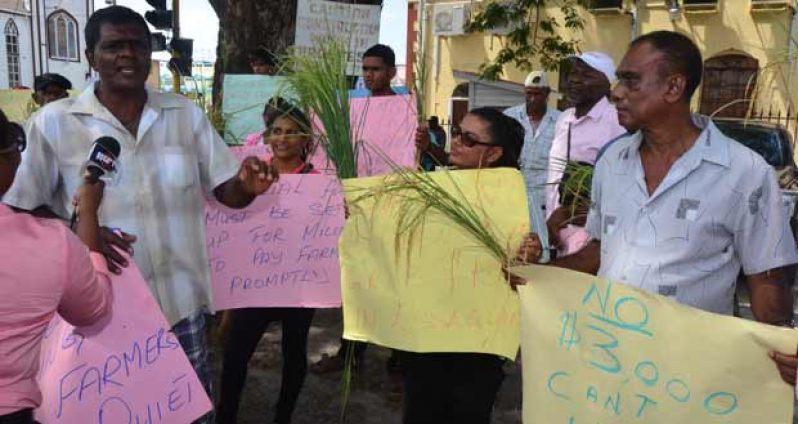SEVERAL rice farmers demanding better prices for their paddy protested outside Public Buildings yesterday as Budget 2014 was being read; and Agriculture Minister Dr. Leslie Ramsammy, noting the protest, gave his assurance that the ministry is continuing its efforts to address the concerns in the rice industry.
Dr Ramsammy said, “The concerns expressed by these farmers have also been raised by farmers who have chosen to speak directly to the Ministry of Agriculture. We have continuously engaged farmers and other stakeholders in addressing relevant concerns.”
The minister acknowledged the right of any citizen to peacefully protest, but stressed that meaningfully working together, as thousands of farmers are doing, is a better option.
Dr Ramsammy said, “The views of those who chose to present those views in the form of public protest are seriously considered. Among the concerns are the prices offered by millers for paddy. The Ministry of Agriculture has been working to expand market opportunities and to enter profitable markets. We will continue to work with farmers and millers to ensure farmers are paid a fair price for paddy.”
OUTSTANDING PAYMENTS
He maintained that the money owed to farmers remains a concern, but pointed out that Government has moved to assist famers by facilitating payment to them on behalf of millers.
Some $400M were paid out to farmers for paddy sold to millers in the 2013 second crop. Dr Ramsammy explained that the ministry is in a position to make the payments because the millers who owe famers are suppliers to the Venezuelan market, and once shipping to the neighbouring country commences, the monies paid would be recouped.
“We will deduct the money from the millers’ payment once we start shipping rice to Venezuela,” he said.
The agreement to have the Agriculture Ministry facilitate payments to the farmers followed engagements with both rice farmers and millers in Guyana’s rice producing regions.
Dr Ramsammy said, “At this time, no farmers are owed. We continue to work with farmers to enhance their productivity (whilst) lowering their cost of production.
“Government (is) providing low cost urea, higher yielding varieties, coupled with improved management practices (which) would have equipped farmers to weather the market fluctuations by improving their efficiencies and cost of production.
“We ask farmers to work with us to protect and promote the welfare of farmers and the industry. We urge all stakeholders for us to work together and resist the temptation to politicize the issues of concern in the rice industry.”
UNFAIR
Minister Ramsammy added that blaming Government for a number of issues is unfair. According to him, the Ministry of Agriculture and its agency, the Guyana Rice Development Board, operate within the laws of Guyana. “We cannot fix paddy price, as this will be against the law. But we urge millers to pay a fair price,” he said.
“We have no paddy-purchasing capacity, and thus cannot influence the price of same. Farmers need to remember that it is this Ministry and Government that started exporting rice to Venezuela in 2009, when the prices were lower ($2,000).
“We continue to use the Venezuela market as an ‘arm-twisting’ tool in influencing the millers to pay higher prices, and this will be done again in 2014. Priority will be given to millers who pay better prices.
“We have engaged millers, and some of them have agreed to make their base price between G$3,500 (and) G$3,700. The increased production over the years has contributed to the reduction of the percentage sold to premium markets.
“While the Government cannot control world market prices, we are working with farmers in reducing cost and improving productivity; import fertiliser and other inputs and sell it at low prices. In 2013, a shipment of 7,000 bags of Urea under the PetroCaribe Agreement was done, and immediately the price from the private sector reduced from in excess of $7,000 to $5,000. The industry uses about 300,000 bags of urea per season, and this will translate to a saving of G$600M to the farmers.”
Dr Ramsammy maintained that efforts are ongoing to support farmers and the rice sector as a whole; and he urged the farmers with concerns to engage the ministry, as other farmers have done.
(By Vanessa Narine )



.jpg)









